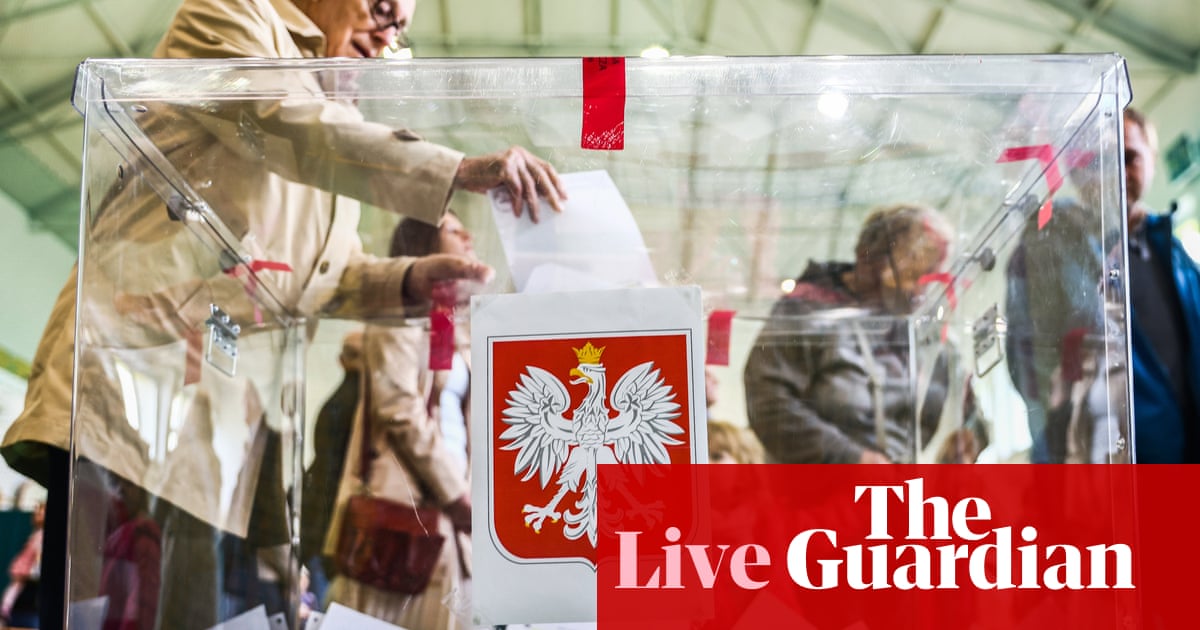
Donald Tusk, the former Polish prime minister and European Council president, claimed victory in Poland’s parliamentary election on Sunday, making the announcement just minutes after the polls closed, based on the results of an exit poll.
The poll suggested the ruling Law and Justice (PiS) party had won the most votes but appeared to show a route to government for a combined opposition coalition led by Tusk.
Tusk appeared on stage at the Civic Coalition election headquarters at Warsaw’s Ethnographical Museum to declare victory.
“It’s the end of the evil times, it’s the end of the PiS rule, we made it,” said Tusk, to cheers from assembled supporters.
“We won democracy, we won freedom, we won our free beloved Poland … This day will be remembered in history as a bright day, the rebirth of Poland,” he said.
The exit poll put PiS on 36.8% and Tusk’s Civic Coalition on 31.6%. However, two groups that could form a coalition with Tusk also did well, with 13% for the centre-right Third Way and 8.6% for the leftwing Lewica.
Such a result, if confirmed, would mean that the three combined parties would have a majority in Poland’s 460-seat parliament. In a further piece of potential good news for Poland’s progressives, the exit poll put Confederation, a far-right coalition tipped to get about 9% of the vote, on 6.2%, lower than pre-election polls had estimated.
More clarity on the results is expected overnight, but the final outcome may only be available well into Monday. An exit poll in Slovakia’s election earlier this month appeared to show a victory for a progressive coalition, only for the actual results to be strikingly different.
However, at the mood at the Civic Coalition headquarters was jubilant. “The next 40 hours, 60 hours will show how we build this coalition. But for us it’s obvious that the [government] coalition will be us, the Third Way and the left,” said Borys Budka, head of the Civic Coalition parliamentary faction.
Budka also said an opposition win would mark the return of Poland to friendly relations with the EU and an end to the threat of a “Polexit”.
Barbara Nowacka, a Civic Coalition MP who has been fiercely critical of PiS crackdown on abortion rights, said it was clear the opposition had won, and said it was an important day for Polish women.
“Young women won’t be afraid to get pregnant, young women won’t be afraid to go to the doctor,” she said.
Jarosław Kaczyński, the PiS chair, said his party’s result was a big success, but admitted “we don’t know” whether the party had a path to government. “Days of fight and tension await us,” he told supporters just after the exit poll was released. If PiS is indeed the biggest party, it has the right to have the first attempt at forming a coalition.
“Whether we are in power or in the opposition, we will continue implementing our project and will not allow Poland to be betrayed,” he said.
In a bitterly divisive campaign over recent months, both sides have painted the vote as being of decisive importance for the future of Poland. Tusk had described the election as “the last chance” to stop PiS from doing irreparable damage to Polish democracy.
PiS, which has governed Poland for eight years, has turned public television into a propaganda arm of the government, restricted abortion rights and demonised LGBTQ+ people, migrants and refugees. It has also put Poland on a collision course with Brussels over rule of law issues, which has led to tens of billions of euros in European funding being frozen.
PiS ran a campaign from the populist playbook, claiming it was the only party that can protect Poland from an “invasion” of refugees. The campaign has also focused on the figure of Tusk, relentlessly attacking the challenger as a foreign stooge.
The election was on course for a turnout of over 72%, the highest since the fall of communism. As the polls closed there were queues remaining outside many polling stations. Authorities said anyone who was queueing before the official end of voting would be able to vote.
Earlier in the day, at one polling station in Wola district, opposition voters expressed confidence at the chances for an opposition victory.
“I saw a lot of young people, more than four or eight years ago, which makes me optimistic,” said Pawel, 46, who had voted for Tusk’s Civic Coalition. At the same polling station Maciej, 78, said the stereotype that older people support PiS was not true. “There are plenty of us who know how to think,” he said, tapping his forehead.
Across town in the Gocław district, 77-year-old Grażyna said she voted for PiS because she believed they are the “fairest” of all the parties. “I hope they will be able to continue changing Poland for the better,” she said, after queueing for 20 minutes to vote.
There were also long queues at Polish consulates abroad, with more than 600,000 Poles living outside the country registering to vote. On social media, people shared photographs and videos of long queues in various cities: one person said they had waited three hours to vote in Palermo without getting to the front of the queue.
Alongside the election, the government held a referendum, which asked four leading questions, including two on migration. One asked if people agree with “the admission of thousands of illegal immigrants from the Middle East and Africa”.
The referendum was seen as a way to boost turnout among the PiS support base, as well as a way to circumvent electoral funding restrictions for the government. The opposition told its supporters to request only an election ballot and decline to take part in the referendum, which requires a 50% turnout to be valid.
With so much at stake in the vote, there have been some concerns of possible foul play. Tens of thousands of Polish volunteers signed up to monitor the vote at polling stations.
There are also concerns about potential attempts to discredit the results or interfere in the process in the event of a PiS defeat. Electoral results are ratified by the Chamber of Extraordinary Control and Public Affairs, added to the supreme court by the PiS government.
Budka, however, said he believed the time for PiS was over. “Even if they try any tricks it wouldn’t be something which changed the result,” he claimed.












